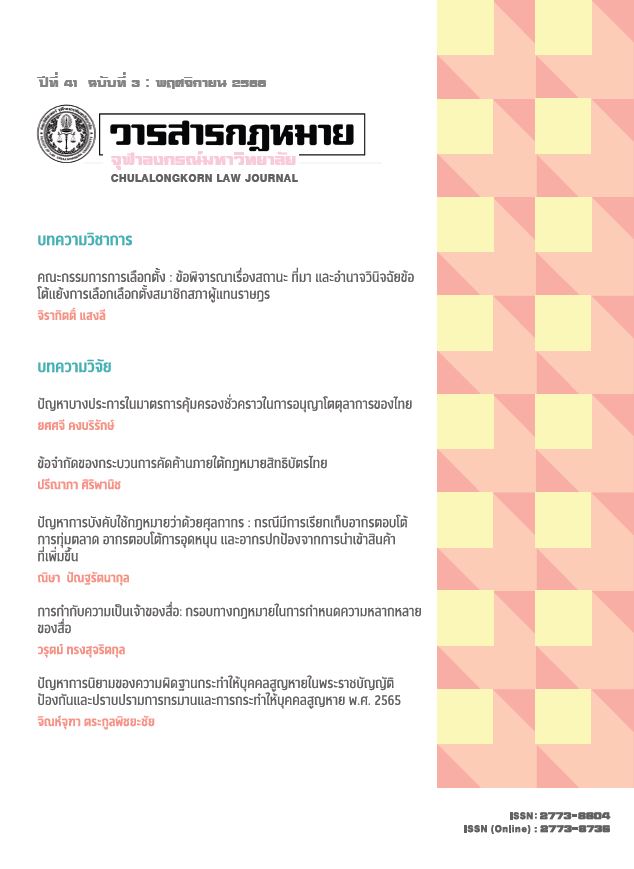ปัญหาบางประการในมาตรการคุ้มครองชั่วคราวในการอนุญาโตตุลาการของไทย
Main Article Content
บทคัดย่อ
พระราชบัญญัติอนุญาโตตุลาการ พ.ศ. 2545 ไม่ได้บัญญัติให้อำนาจอนุญาโตตุลาการในการออกมาตรการคุ้มครองชั่วคราว ทั้งที่พระราชบัญญัติฉบับดังกล่าวมีกฎหมายแม่แบบว่าด้วยอนุญาโตตุลาการทางพาณิชย์ระหว่างประเทศของคณะกรรมาธิการว่าด้วยกฎหมายการค้าแห่งสหประชาชาติ ค.ศ. 1985 เป็นแบบในการร่างกฎหมาย จึงเกิดคำถามว่า “อนุญาโตตุลาการมีอำนาจในการออกมาตรการคุ้มครองชั่วคราวหรือไม่” บทความนี้กล่าวถึงปัญหาบางประการของการใช้มาตรการคุ้มครองชั่วคราวในการอนุญาโตตุลาการภายใต้กฎหมายไทย ได้แก่ ปัญหาความไม่ชัดเจนในบทบัญญัติเรื่องมาตรการคุ้มครองชั่วคราวในพระราชบัญญัติอนุญาโตตุลาการ พ.ศ. 2545 และปัญหาการบังคับใช้มาตรการคุ้มครองชั่วคราวที่ออกโดยอนุญาโตตุลาการ เพื่อเป็นแนวทางในการแก้ไขกฎหมายต่อไป
Article Details

อนุญาตภายใต้เงื่อนไข Creative Commons Attribution-NonCommercial-NoDerivatives 4.0 International License.
ลิขสิทธิ์และเนื้อหาในเว็บไซต์ของวารสารกฎหมาย (รวมถึง โดยไม่จำกัดเฉพาะ เนื้อหา รหัสคอมพิวเตอร์ งานศิลป์ ภาพถ่าย รูปภาพ ดนตรีกรรม โสตทัศนวัสดุ) เป็นกรรมสิทธิ์ของวารสารกฎหมาย และผู้ได้รับการโอนสิทธิทุกราย
1. วารสารกฎหมาย ให้อนุญาตให้คุณใช้สิทธิอันไม่เฉพาะเจาะจงที่สามารถถูกถอนเมื่อใดก็ได้ โดยไม่มีค่าใช้จ่าย ในการ
- เยี่ยมชมเว็บไซต์และเอกสารในเว็บไซต์นี้ จากคอมพิวเตอร์หรือเครื่องมือสื่อสารผ่านเว็บบราวเซอร์
- คัดลอกและจัดเก็บเว็บไซต์และเอกสารในเว็บไซต์นี้บนลงคอมพิวเตอร์ของคุณผ่านระบบความจำ cache
- สั่งพิมพ์เอกสารจากเว็บไซต์นี้สำหรับการใช้ส่วนตัวของคุณ
- ผลงานที่ได้รับการตีพิมพ์โดยวารสารกฎหมาย จุฬาลงกรณ์มหาวิทยาลัย ถูกคุ้มครองภายใต้ Creative Commons Attribution 4.0 International License ซึ่งอนุญาตให้ทุกคนสามารถคัดลอก แจกจ่าย ดัดแปลง ส่งต่อ ผลงานได้ ก็ต่อเมื่อผลงานและแหล่งข้อมูลได้รับการอ้างอิงอย่างเหมาะสม
2. วารสารกฎหมาย จุฬาลงกรณ์มหาวิทยาลัย สงวนสิทธิ์ไม่อนุญาตให้คุณใช้สิทธิอื่นใดที่เกี่ยวข้องกับเว็บไซต์และเอกสารบนเว็บไซต์นี้ เช่น การคัดลอก ดัดแปลง เปลี่ยนแปลง ส่งต่อ ตีพิมพ์ แจกจ่าย เผยแพร่ จัดแสดงในที่สาธารณะ ไม่ว่าจะในรูปแบบใดก็ตาม ซึ่งเว็บไซต์หรือเอกสารบนเว็บไซต์ โดยไม่อ้างอิงถึงแหล่งข้อมูลหรือโดยไม่ได้รับอนุญาตเป็นลายลักษณ์อักษรจากวารสารกฎหมาย จุฬาลงกรณ์มหาวิทยาลัย
3. คุณอาจขออนุญาตที่จะใช้เอกสารอันมีลิขสิทธิ์บนเว็บไซต์นี้โดยการเขียนอีเมลล์มายัง journal@law.chula.ac.th
4. วารสารกฎหมาย จุฬาลงกรณ์มหาวิทยาลัย เข้มงวดกับการคุ้มครองลิขสิทธิ์อย่างมาก หากวารสารกฎหมาย จุฬาลงกรณ์มหาวิทยาลัยพบว่าคุณได้ใช้เอกสารอันมีลิขสิทธิ์บนเว็บไซต์นี้โดยไม่ถูกต้องตามการอนุญาตให้ใช้สิทธิ ดังที่กล่าวไปข้างต้น วารสารกฎหมาย จุฬาลงกรณ์มหาวิทยาลัยอาจดำเนินคดีตามกฎหมายต่อคุณได้ เพื่อเรียกร้องค่าเสียหายที่เป็นตัวเงินและคำขอชั่วคราวให้คุณหยุดการใช้เอกสารดังกล่าว ทั้งนี้ คุณอาจถูกสั่งให้ชดใช้ค่าใช้จ่ายใดๆ ที่เกี่ยวข้องกับการดำเนินการตามกฎหมายนี้
หากคุณพบเห็นการใช้เอกสารอันมีลิขสิทธิ์ของวารสารกฎหมาย จุฬาลงกรณ์มหาวิทยาลัย ที่ขัดหรืออาจขัดต่อการอนุญาตให้ใช้สิทธิดังที่ได้กล่าวไปข้างต้น โดยเชื่อว่าได้ละเมิดลิขสิทธิ์ของคุณหรือของผู้อื่น สามารถร้องเรียนมาได้ที่ journal@law.chula.ac.th
เอกสารอ้างอิง
Shalaan Wael, "Interim Measures in International Commercial Arbitration – a Comparative Study of the Egyptian, English and Scottish Law" (Doctoral dissertation, Department of Law, University of Stirling, 2013)
Stephen M. Ferguson, "Interim Measures of Protection in International Commercial Arbitration: Problems, Proposed Solutions, and Anticipated Results," INT'l TRADE L.J 12, 55 (2003).
United Nation, "UNCITRAL Model Law on International Commercial Arbitration (1985), with Amendments as Adopted in 2006," [Online] Available from: https://uncitral.un.org/en/texts/arbitration/modellaw/commercial_arbitration Accessed 16 October 2021.
United Nation, "Status: UNCITRAL Model Law on International Commercial Arbitration (1985), with Amendments as Adopted in 2006," [Online] Available from: https://uncitral.un.org/en/texts/arbitration/modellaw/commercial_arbitration/status Accessed 21 October 2021.
สถาบันอนุญาโตตุลาการ สำนักงานศาลยุติธรรม, "มาตรการคุ้มครองชั่วคราวในกระบวนการอนุญาโตตุลาการ" [ออนไลน์] แหล่งที่มา: https://hi-in.facebook.com/taiarbitration/videos/317574953436203/?comment_id=
เข้าถึงเมื่อ 21 ตุลาคม 2564.
พิศุทธ์ อรรถกมล, "มาตรการคุ้มครองชั่วคราวก่อนมีคำชี้ขาดในอนุญาโตตุลาการระหว่างประเทศ," ใน 65 ปี เกียรติขจร: รวมบทความวิชาการ เนื่องในโอกาส 65 ปี อาจารย์เกียรติขจร วัจนะสวัสดิ์ (กรุงเทพมหานคร: โรงพิมพ์เดือนตุลา, 2557)
Shadat Mohmeded, "A Critical Analysis of Arbitral Provisional Measures in England and Wales" ( Degree of Doctor of Philosophy in Law, Brunel University, 2014)
เสาวนีย์ อัศวโรจน์, คำอธิบายกฎหมายว่าด้วยวิธีการระงับข้อพิพาททางธุรกิจโดยการอนุญาโตตุลาการ พิมพ์ครั้งที่ 3 (กรุงเทพมหานคร: โครงการตำราคณะนิติศาสตร์ มหาวิทยาลัยธรรมศาสตร์, 2554)
กนกพรรณ ชลชวลิต, “มาตรการคุ้มครองชั่วคราวก่อนมีคำชี้ขาดในกระบวนการอนุญาโตตุลาการ” [ออนไลน์] แหล่งที่มา: https://thac.or.th/th/ เข้าถึงเมื่อ 14 ตุลาคม 2564.
Expert-Evidence, "Kinds of Interim Measures in Arbitration," [Online] Available from: https://expert-evidence.com/kinds-of-interim-measures-in-arbitration/ Accessed 12 October 2021.
Mika SAVOLA, "Interim Measures and Emergency Arbitrator Proceedings," Croat. Arbit. Yearb. 23(2016): 77.
Joseph Lee, "Court-Subsidiarity and Interim Measures in Commercial Arbitration: A Comparative Study of UK, Singapore and Taiwan," CONTEMP. Asia ARB. J 6, 2 (2013): 57.
Steven Gee, Mareva Injunctions and Anton Piller Relief, 4 ed. (London: Sweet & Maxwell, 1998)
Shaneen Parikh and Cyril Amarchand Mangaldas, "Obtaining Interim and Permanent Relief in International Ip Arbitration" [Online] Available from: https://www.iam-media.com/global-guide/the-guide-ip-arbitration/1st-edition/article/obtaining-interim-and-permanent-relief-in-international-ip-arbitration Accessed 6 November 2022.
Ronald Wong, "Interim Relief in Aid of International Commercial Arbitration," SAcLJ 24(2012): 528.
"Quiborax S.A., Non Metallic Minerals S.A., & Allan Fosk Kaplún V. Plurinational State of Bolivia, Icsid Case No. Arb/06/2," (2016).
Stephen Benz, "Strengthening Interim Measures in International Arbitration," Georgetown Journal of International Law 50(2019): 157-158.
Jose F. SANCHEZ, "Applying the Model Law’s Standard for Interim Measures in International Arbitration," Journal of International Arbitration 37, 1 (2020): 69-71.
John Choong, Mark Mangan, and Nicholas Lingard, A Guide to the SIAC Arbitration Rules (Oxford: Oxford University Press, 2018)
รุ่งระวี โสขุมา, "แนวทางการเพิ่มประสิทธิภาพกระบวนการอนุญาโตตุลาการระหว่างประเทศของไทย : ศึกษาเฉพาะกรณีสถาบันอนุญาโตตุลาการ สำนักงานศาลยุติธรรม" วิทยานิพนธ์ปรัชญาดุษฎีบัณฑิต สาขาวิชาการบริหารกระบวนการยุติธรรม มหาวิทยาลัยธรรมศาสตร์, 2560)
Waraporn Thong-intr, "เรื่องไม่ใหม่ที่กฎหมายอนุญาโตตุลาการไทยไม่มี : มาตรการคุ้มครองชั่วคราวโดยอนุญาโตตุลาการ" [ออนไลน์] แหล่งที่มา: https://www.wcclawoffice.com/post/2013/05/01/this-is-the-title-of-your-first-blog-post เข้าถึงเมื่อ: 27 ตุลาคม 2565.
Joseph Lee, "Court-Subsidiarity and Interim Measures in Commercial Arbitration: A Comparative Study of UK, Singapore and Taiwan," CONTEMP. Asia ARB. J 6, 2 (2013): 231.
Arbitration Law of the People's Republic of China section 28, 46 and 68
RAYMOND GAO, "Bridging an Access-to-Justice Gap for International Commercial Dispute Resolution: Recent Developments of Interim Measures in Cross Border Chinese Arbitration," Colombia Journal of Transnational Law 59, 3 (2021): 636-638.
The International Arbitration Act: IAA article 12(6)
Ali Yesilirmak, "Provisional Measures in International Commercial Arbitration" (Doctoral dissertation, University of London, 2003)
Albert Jan van den Berg, "New York Convention of 1958: Refusals of Enforcement," ICC International Court of Arbitration Bullentin 18, 2 (2007): 26.
ศักรินทร์ บุญรอด, "การคุ้มครองชั่วคราวก่อนการแต่งตั้งคณะอนุญาโตตุลาการในการอนุญาโตตุลาการทางการพาณิชย์ระหว่างประเทศ" (นิติศาสตรมหาบัณฑิต, สาขากฎหมายธุรกิจ คณะนิติศาสตร์, มหาวิทยาลัยธรรมศาสตร์, 2556)
Martin J. Valasek and Jenna Anne de Jong, "Enforceability of Interim Measures and Emergency Arbitrator Decisions," [Online] Available from: https://www.nortonrosefulbright.com/en/knowledge/publications/6651d077/enforceability-of-interim-measures-and-emergency-arbitrator-decisions Accessed 4 December 2022.
Albert Jan van den Berg, "New York Convention of 1958: Refusals of Enforcement," ICC International Court of Arbitration Bullentin, 18: 26.


